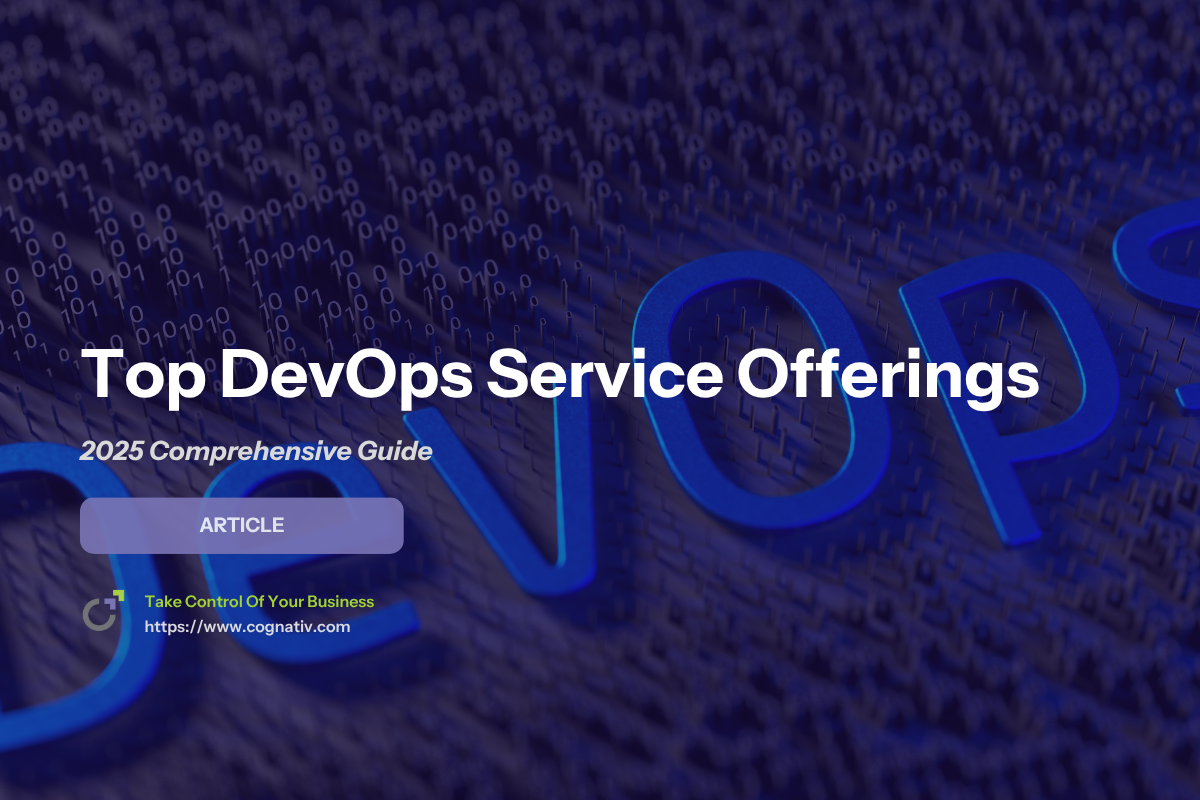Top DevOps Service Offerings for 2025: A Comprehensive Guide
What are the essential DevOps service offerings you should consider? In this comprehensive guide, we’ll explore top solutions like CI/CD pipelines, infrastructure as code, and managed DevOps services. Discover how these offerings can enhance your development workflows and ensure smooth, reliable software releases.
Key Takeaways
-
DevOps represents a cultural shift aimed at enhancing collaboration between development and operations teams, resulting in more efficient software development and deployment processes.
-
Core DevOps practices such as Continuous Integration and Continuous Delivery (CI/CD), Infrastructure as Code (IaC), and Configuration Management are essential for streamlining workflows and delivering high-quality software rapidly.
-
Emerging trends in DevOps, including AI, machine learning, and DevSecOps, are set to transform the landscape by automating workflows, optimizing resource management, and integrating security seamlessly into the software development lifecycle.
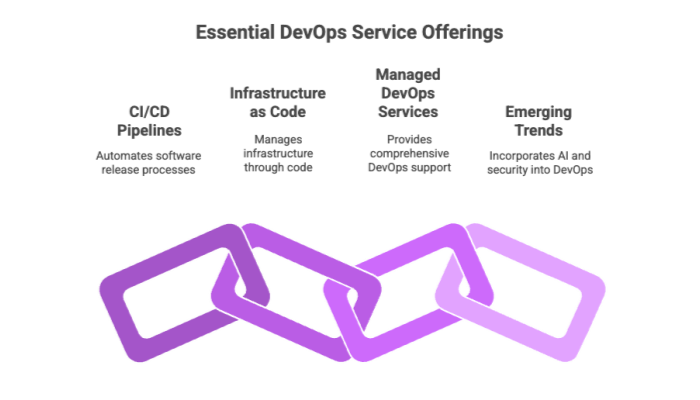

Understanding DevOps Service Offerings
DevOps is more than just a set of practices; it is a cultural shift that aims to bridge the gap between development and operations teams, fostering a spirit of collaboration and efficiency. Integrating development and operations into a unified workflow makes organizations more responsive to market changes and customer needs.
The core aim is to create an integrated work environment where collaboration, monitoring, and automation thrive. This holistic approach not only improves the software development lifecycle but also aligns organizational goals with the production of high-quality software products.
Key Benefits of DevOps Services
The implementation of DevOps practices brings a plethora of benefits. Key among them is the enhancement of collaboration between development and operations teams, which streamlines the software development lifecycle. This increased collaboration leads to a significant reduction in cycle times and a marked increase in deployment frequency, all of which align with a devops approach.
Additionally, the adoption of CI/CD practices allows for rapid delivery of features and updates, significantly improving user satisfaction. Automation and streamlined processes within DevOps empower development teams to deliver high-quality software consistently and efficiently.
Core Principles of DevOps Practices
At the heart of DevOps practices are several core principles that drive its success. Continuous integration is a fundamental principle that allows teams to detect problems early in the development process, thereby reducing the risk of major issues. Infrastructure automation is another crucial aspect, enabling teams to manage system configurations predictably and efficiently.
These principles, when combined with a culture of collaboration and continuous improvement, lay the foundation for a robust and effective DevOps implementation.
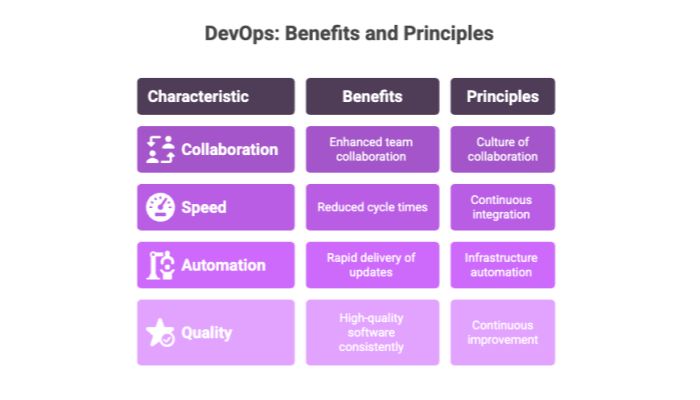

Comprehensive DevOps Solutions
Comprehensive DevOps solutions encompass a range of practices and tools designed to enhance the efficiency and reliability of software development and deployment processes. Key among these solutions are Infrastructure as Code (IaC), Continuous Integration and Continuous Delivery (CI/CD), and Configuration Management.These solutions leverage automation and orchestration to streamline workflows, reduce errors, and accelerate time to market. Adopting these solutions enables organizations to achieve faster, more reliable software delivery while aligning development processes with business goals and agile methodologies.
Infrastructure as Code (IaC)
Infrastructure as Code (IaC) is a practice that involves managing and provisioning infrastructure through machine-readable scripts, such as Terraform. One of the key benefits of IaC is its scalability, allowing teams to automate the provisioning and configuration of resources efficiently. Integrating IaC methods throughout the continuous delivery pipeline—from development to automated testing and live deployment—significantly reduces configuration errors and enhances overall efficiency.
In 2025, the adoption of IaC is expected to continue growing, driven by the need for scalable, automated infrastructure management.
Continuous Integration and Continuous Delivery (CI/CD)
Continuous Integration and Continuous Delivery (CI/CD) are foundational practices in DevOps that ensure the consistent and rapid delivery of high-quality software. The CI/CD pipeline involves continuous development, integration, testing, continuous deployment, and deployment, each stage designed to speed up software delivery and improve quality.
Tools like Jenkins play a vital role in facilitating CI/CD by automating tasks and streamlining the development process. Focusing on automation and integration allows CI/CD practices to help organizations achieve more successful deployments and maintain a competitive edge.
Configuration Management
Configuration Management is a critical aspect of DevOps that ensures systems are configured consistently across different environments. Tools like Puppet and Ansible automate the enforcement of desired configurations, reducing the risk of configuration drift and ensuring that software behaves the same regardless of where it’s deployed.
Effective configuration management, maintaining stability, improves reliability, and supports the overall goals of DevOps by ensuring smooth and predictable deployments.
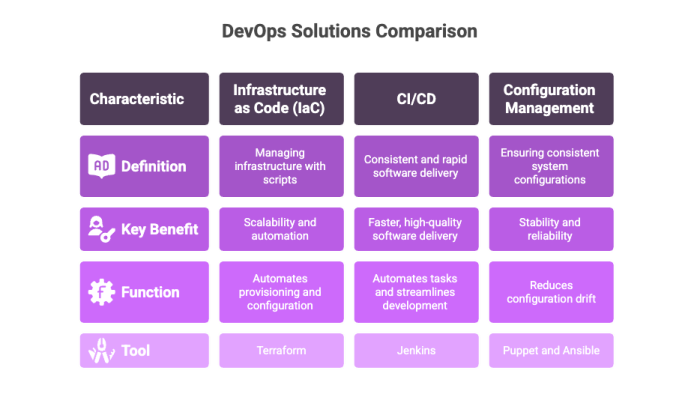

Leading Cloud Platforms for DevOps
Cloud platforms have become indispensable in the DevOps landscape, offering scalable infrastructure and a wide array of tools that streamline software development and deployment processes in a cloud environment. These platforms provide unique features tailored for DevOps, such as automation capabilities, integrated development environments, and extensive resource management options.Leveraging cloud platforms enhances collaboration, improves efficiency, and accelerates delivery cycles, making them a cornerstone of modern DevOps practices.
AWS DevOps Tools
AWS offers a comprehensive suite of DevOps tools designed to automate build, test, and deployment processes. Tools like AWS CodePipeline and CodeDeploy facilitate continuous delivery by executing automated tasks on code changes, ensuring that deployments are consistent and reliable.
AWS CodeBuild, a fully managed service, compiles code and runs quality assurance tests, while AWS CodeDeploy delivers working packages to instances and synchronizes builds to deploy code. Integrating these tools allows AWS to provide a scalable and secure continuous delivery model in the cloud.
Azure DevOps Services
Azure DevOps is a SaaS platform from Microsoft that offers an end-to-end DevOps toolchain, encompassing the full development lifecycle from planning to deployment. Azure Pipelines facilitates planning, collaboration, and deployment, while Azure Repos, azure boards, and azure test plans enhance application lifecycle management and development workflows.
The platform’s user-friendly interface and seamless integration with third-party tools make it a versatile and powerful solution for DevOps environments.
Google Cloud Platform for DevOps
Google Cloud Platform (GCP) offers a suite of DevOps tools that facilitate continuous delivery and scalable infrastructure management. Key tools within GCP include Cloud Deploy for continuous delivery and Cloud Build for efficient automation of builds and deployments.
GCP’s Deployment Manager allows teams to specify the desired state of deployments using templates in programming languages such as YAML and Python, ensuring repeatable and efficient deployment procedures. Leveraging GCP’s capabilities enables organizations to achieve reliable, scalable, and automated DevOps workflows.
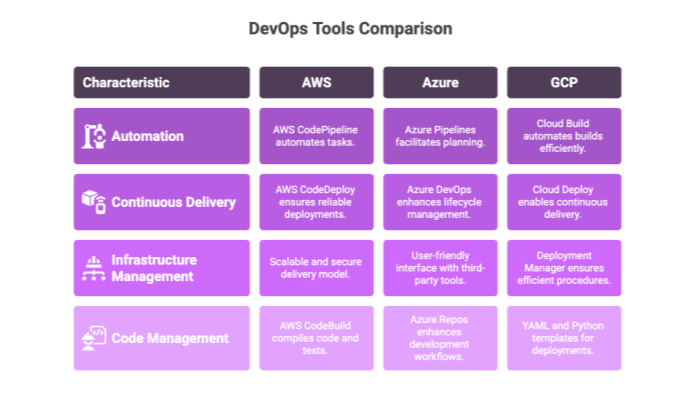

Managed DevOps Services
Managed DevOps services combine DevOps principles with managed services to ensure smooth software development processes. These services usually encompass CI/CD pipelines and Infrastructure as Code (IaC) implementation. They also cover monitoring systems, security protocols, and performance optimization tools, including devops as a service.
Outsourcing DevOps allows organizations to benefit from expert resources and predictable costs while avoiding the complexities of hiring and training staff. The collaboration and focus provided by managed service providers enhance the overall effectiveness of the software development lifecycle and their service offering.
Fully Managed Service Providers
Fully managed service providers play a crucial role in enhancing DevOps workflows by handling all aspects of the development process, from development to final deployment. Providers like Phantom, Ansible, Puppet, Zeet, and eG Enterprise offer a range of automation and orchestration tools that streamline tasks and improve efficiency.
Leveraging these providers allows organizations to focus on their core business while benefiting from secure, reliable, and efficient DevOps practices.
Choosing the Right Service Provider
Choosing the right managed service provider is critical for the success of DevOps initiatives. Businesses should assess the provider’s track record and expertise in delivering successful DevOps implementations, as well as their ability to scale services according to business needs. Effective communication and support from the provider are also crucial factors that can significantly impact the success of DevOps initiatives.
Selecting the right provider ensures a smooth and effective DevOps journey.
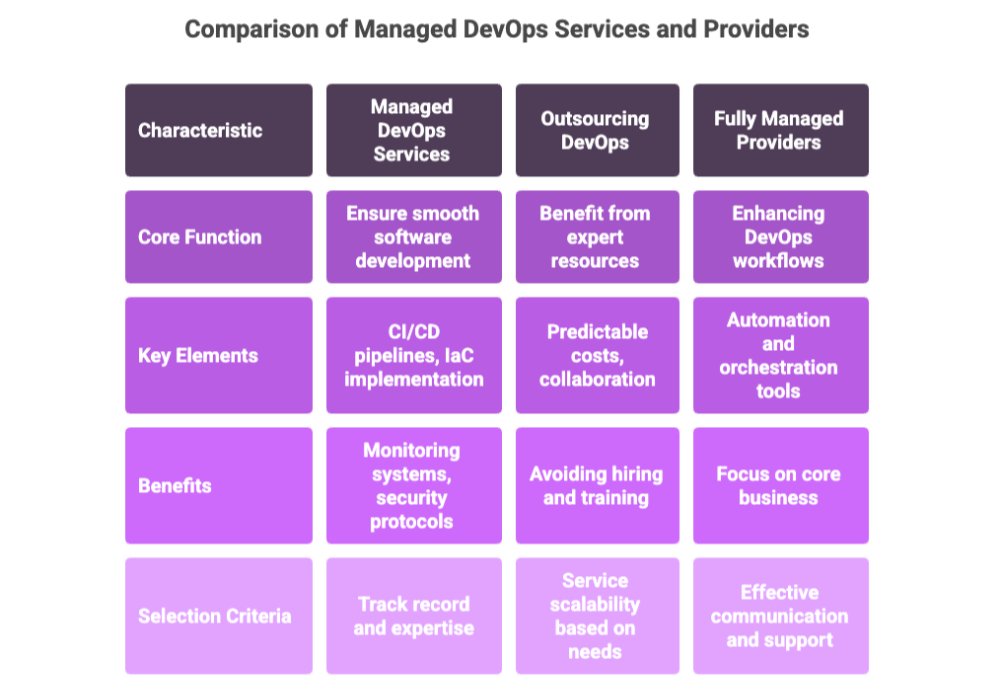

Enhancing Development Processes with DevOps Tools
DevOps tools are essential for streamlining development workflows, improving code integrity, and facilitating efficient software releases. Leveraging tools for build automation, monitoring, and collaboration improves the efficiency and reliability of software development processes, especially when utilized by a devops engineer.
These tools not only reduce manual errors but also empower development teams to focus on more strategic tasks, thereby boosting overall productivity.
Build Automation Tools
Build automation tools simplify the process of software development, allowing for greater efficiency and reliability in project management. Tools like Jenkins and Maven facilitate continuous integration and save time by reducing provisioning needs during the development lifecycle.
Gradle enhances build automation by allowing build scripts in multiple programming languages, providing flexibility to developers. These tools streamline processes, leading to reduced manual errors and improved overall efficiency in development.
Monitoring and Logging Tools
Monitoring and logging tools are crucial in DevOps for troubleshooting and ensuring system reliability. The ELK stack serves as a powerful solution for aggregating log data from various sources for analysis and troubleshooting.
Real-time monitoring tools like SignalFx provide insights into application performance and system health, while Nagios is used for monitoring and managing IT infrastructure. These tools enhance the overall reliability and performance of software systems.
Collaboration and Communication Tools
Collaboration and communication tools play a vital role in enhancing DevOps workflows by streamlining communication among team members during the release management process. Platforms like Slack integrate with other tools to enhance communication and reduce response times during incidents. Atlassian Statuspage is utilized to communicate system status and incidents, helping to maintain user trust and transparency.
These new tools empower development teams to collaborate effectively, ensuring timely application deployment and successful deployments throughout the release management cycle.
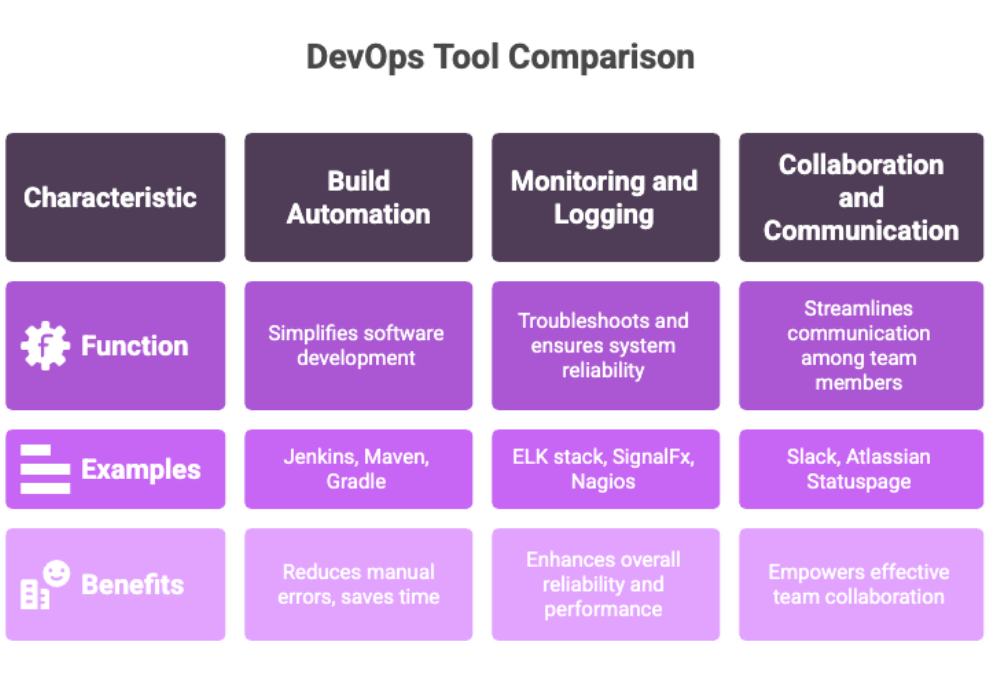

Implementing DevOps in Your Organization
Implementing DevOps in an organization involves several stages, including analysis, design, construction, automation, and the process implementation of the deployment process. Adopting devops methodology plays a crucial role in improving resource control and reducing manual errors, allowing teams to focus on more beneficial tasks.
The focus of DevOps is heavily rooted in transforming the culture and principles within an organization to become more agile and collaborative. Following a structured approach enables organizations to achieve successful DevOps implementation and enjoy enhanced efficiency and collaboration.
Developing a DevOps Assessment Roadmap
Developing a DevOps assessment roadmap is crucial for a successful DevOps adoption. This involves assessing the current state by mapping existing workflows to identify inefficiencies and pain points. Setting clear, measurable goals helps guide the implementation process and aligns it with overall business strategies.
Visualizing the target state and pinpointing measurable metrics are key components of the assessment roadmap. Following this roadmap ensures a smooth transition to DevOps practices.
Training and Empowering Development Teams
Training and empowering development teams are essential for effective DevOps practice. Providing ongoing training and resources ensures that devops teams understand DevOps practices and can fully utilize the tools and methodologies.
DevOps managed service providers facilitate seamless timely communication among development teams, enhancing collaboration and reducing project delays. Investing in training and empowerment fosters a culture of collaboration and continuous improvement, often guided by devops consultants.
Continuous Testing and Quality Assurance
Continuous testing is essential for maintaining high-quality code and reliability throughout the software development lifecycle. CI/CD practices help in maintaining high-quality software by automating the integration and delivery processes. Automated testing integrated throughout the development lifecycle is critical for maintaining code quality while enabling rapid deployment.
Incorporating shift-left testing processes practices allows teams to identify and address defects earlier in the development process, leading to improved software quality.
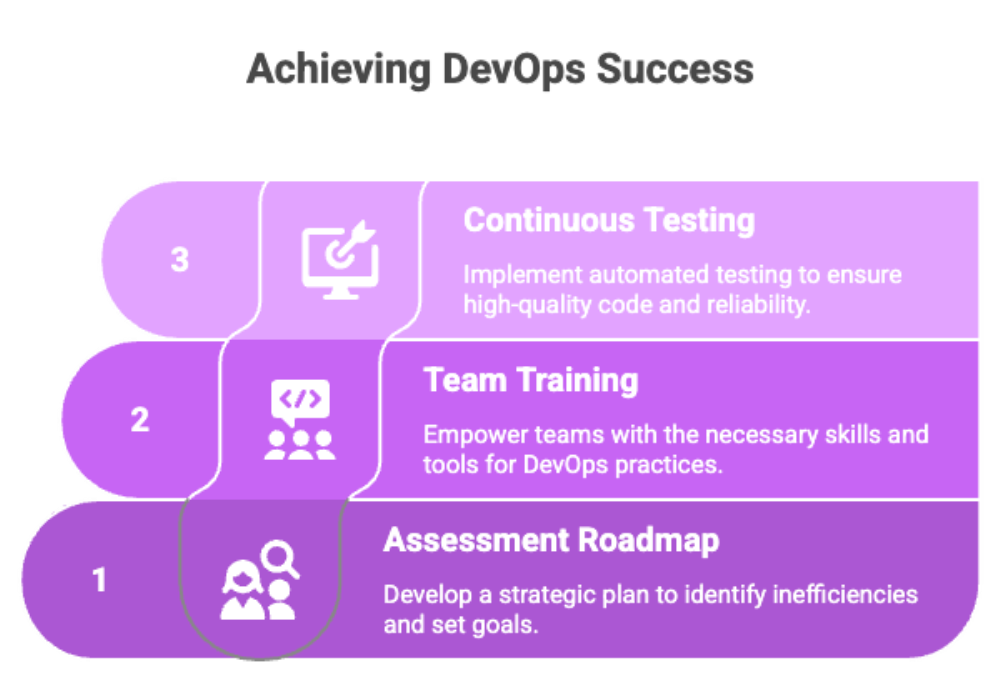

The Future of DevOps: Trends to Watch
The DevOps landscape is continually evolving, with new trends and technologies shaping its future. Emerging trends such as Site Reliability Engineering (SRE), AI, and DevSecOps are set to revolutionize the way we approach DevOps practices. These trends prioritize practical applications, user experience, and security, ensuring that DevOps remains at the forefront of software development innovation.
AI and Machine Learning in DevOps
AI and machine learning are anticipated to play a significant role in automating DevOps workflows and improving code generation by 2025. These technologies can analyze vast amounts of data to predict future incidents and optimize resource management, thereby enhancing overall efficiency.
Integrating AI and machine learning into DevOps enables more intelligent, automated, and efficient development processes.
DevSecOps: Integrating Security into DevOps
DevSecOps is an emerging trend that integrates security into the DevOps process, ensuring that security practices are aligned with dynamic application development. API gateways can be used to manage access control and enhance overall security.
Merging cloud-based architecture with DevOps allows organizations to leverage scalable resources to enhance security practices and ensure robust protection throughout the software development lifecycle.
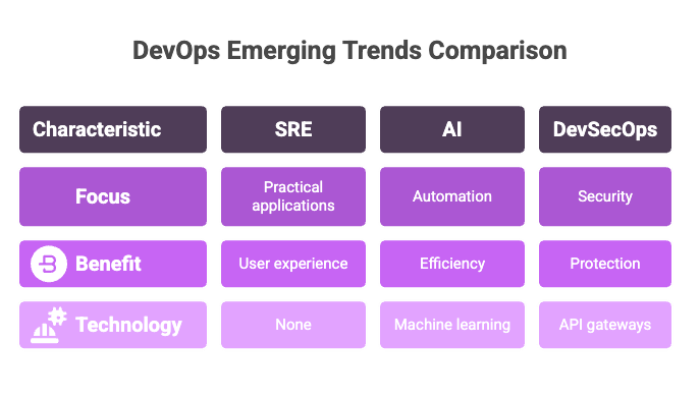

Summary
In summary, the top DevOps service offerings for 2025 are set to revolutionize the software development landscape by enhancing collaboration, efficiency, and security. By adopting comprehensive DevOps solutions, leveraging leading cloud platforms, and choosing the right managed service providers, organizations can achieve faster, more reliable software delivery. As we look to the future, trends like AI, machine learning, and DevSecOps will continue to shape the DevOps landscape, ensuring that it remains at the forefront of innovation.
Embracing these advancements will empower organizations to stay competitive and achieve their business goals with confidence.

Frequently Asked Questions
DevOps service offerings are evolving rapidly to meet the demands of modern software development. Leveraging cloud platforms like Azure services and AWS CloudFormation, these offerings automate repetitive tasks and streamline the deployment process for web applications in production environments. Integrating tools such as Azure Artifacts and infrastructure automation, organizations can enhance continuous integration and delivery, ensuring faster, more reliable software releases.
What are the key benefits of adopting DevOps practices?
Adopting DevOps practices enhances collaboration between development and operations teams, reduces cycle times, increases deployment frequency, and improves software quality through automation and continuous delivery. Such benefits collectively drive efficiency and effectiveness in software development.
How does Infrastructure as Code (IaC) benefit organizations?
Infrastructure as Code (IaC) significantly benefits organizations by automating resource provisioning and configuration, which enhances scalability and minimizes configuration errors. This improvement leads to greater efficiency in the continuous delivery pipeline.
What role do cloud platforms play in DevOps?
Cloud platforms play a crucial role in DevOps by offering scalable infrastructure and a variety of tools that facilitate streamlined software development and deployment. This ultimately enhances collaboration, improves efficiency, and accelerates delivery cycles.
What should businesses consider when choosing a managed service provider for DevOps?
When selecting a managed service provider for DevOps, businesses must evaluate the provider's proven experience, expertise in successful implementations, scalability of services, and the quality of communication and support offered. These factors are crucial for ensuring a successful partnership that meets evolving business requirements.
How is AI expected to impact DevOps in the future?
AI is expected to significantly enhance DevOps by automating workflows, improving code generation, and optimizing resource management through data analysis. This will lead to greater efficiency and more intelligent development processes.

